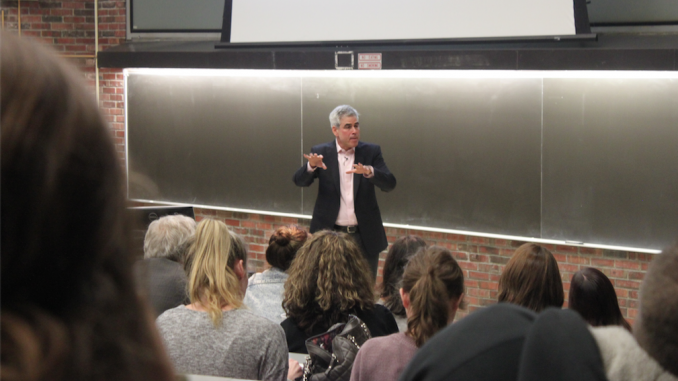
In the midst of a nationwide conversation about social justice on college campuses, SUNY New Paltz hosted a renowned psychologist to discuss his research on the subject.
On Thursday, Sept. 29, Dr. Jonathan Haidt delivered a lecture entitled “How Two Incompatible Sacred Values are Driving Conflict and Confusion in American Universities.” Haidt, the Thomas Cooley Professor of Ethical Leadership at New York University, was the top choice of the faculty task force, according to Glenn Geher, chair of the psychology department and leader of the free speech task force.
Last spring, the task force was assembled by SUNY New Paltz President Donald P. Christian after a politics and media debate was abruptly cancelled by the Office of Student Activities and Union Services, (OSAUS). The debate was cancelled by OSAUS director Mike Patterson after what Christian referred to as “a robust email dialogue” among faculty over the inclusion of Cliff Kincaid.
Because of conditions in their contract, the speakers were still paid $7,500 for the sudden cancellation. On Oct. 20, Kincaid and Steve Rendall, senior analyst at FAIR (Fairness and Accuracy In Reporting), will participate in the rescheduled debate.
The contract between SUNY New Paltz and Haidt, which was obtained by The New Paltz Oracle via FOIL request, amounted to $10,000. According to Richard Winters, SUNY New Paltz’s community and government relations associate, Haidt usually has a fee of $30,000 and initially reduced his price to $15,000, before ultimately settling for $10,000.
Prior to his lecture, Haidt met with approximately 15 students for a discussion about the climate on campus, specifically about trigger warnings and whether or not they should be included as part of the college experience. Students were selected from various majors in order to include a diversity of opinions regarding Haidt’s article “The Coddling of the American Mind” which was published in The Atlantic in 2015. Haidt regarded the meeting as a success, commenting that most students wanted to hear more opposing views in the classroom, even if they didn’t agree with them.
Later, Haidt’s lecture focused on the difference between the educational goals for universities, dividing them by those who seek truth and those who seek social justice, which he referred to as “Social Justice University” (SJU). Haidt listed seven challenges facing SJU, including telos, motivated reasoning, sacredness, blasphemy, anti-fragility, correlation and schism.
“The first wave of change, of political correctness in the 90s, was good for universities,” Haidt said. “It was good to diversify faculty and expand the literary canon for students. However, this second wave, the one of the early 2000s that exploded in 2015, has been one of confusion.”
The basis for Haidt’s arguments rested on statistics outlining societal trends and recent developments in academia, which he himself has been studying since the early 1990s. This includes the fact that professors are now twice as liberal as they were in 1996, and for fellow psychologists during that same period of time, they are more than three times as liberal as they once were.
Citing the damage done by the popularization of safe spaces on campuses and “victimhood culture,” Haidt argued that students now walk on eggshells in the classroom, which leads to a loss of critical thinking skills. He stated that professors now fear their own students, particularly those who might protest what they are learning. Citing the incident at Emory University where students said they felt threatened by chalk writings around campus that said “Trump 2016,” he posited that students who view themselves as sacred contribute to the continued polarization of this country.
“What was sacred at a university, thirty years ago? Truth,” Haidt said. “What is sacred now? Social justice. The academy, our universities, simply cannot pursue both truth and social justice.”
Concluding his talk, Haidt argued that a schism, similar to the one in the 19th century between universities pursuing truth and divinity schools pursuing Jesus Christ, would be necessary for schools pursuing social justice. He pointed to Brown University’s decision to embrace social justice as a “bedrock to our capacity to fulfill our mission as a university” and their $100 million investment in “inclusivity efforts.” Haidt contrasted their actions with those of the University of Chicago, where their president issued a letter to the incoming class of 2020, stating that the school “does not support so-called ‘trigger warnings.’”
Haidt promoted his educational project for campus inclusion of viewpoint diversity, Heterodox Academy. He encouraged students, specifically those in student government, to push for a referendum to explicitly support viewpoint diversity, saying that New Paltz could have the potential to differentiate itself as a university in pursuit of truth.
Correction:
Dear Mr. Kincaid,
I want to clarify a sentence in my article on Oct. 6, “NYU Professor Talks Trigger Warnings on Campus.” There seems to be some misinterpretation on my part about past statements you have made, namely that, “President Barack Obama was born in Kenya and that the LGBTQIA+ community is responsible for global warming.”
Misinterpreting a web page detailing your past statements on the Southern Poverty Law Center’s website, I incorrectly attributed those aforementioned claims to you and for that I apologize. It was not my intention to misrepresent you and there was certainly no intent behind it.
To be clear, I am at fault and take responsibility for my mistake. I take great pride in my work as an aspiring journalist and it has been a humbling experience to make a mistake of this degree. We will make the necessary corrections to the article and work to improve our fact-checking process for the future.
I look forward to your appearance on campus for the rescheduled debate with Steve Rendall on Oct. 20.
Sincerely,
Jack O’Brien
Managing Editor
The New Paltz Oracle
